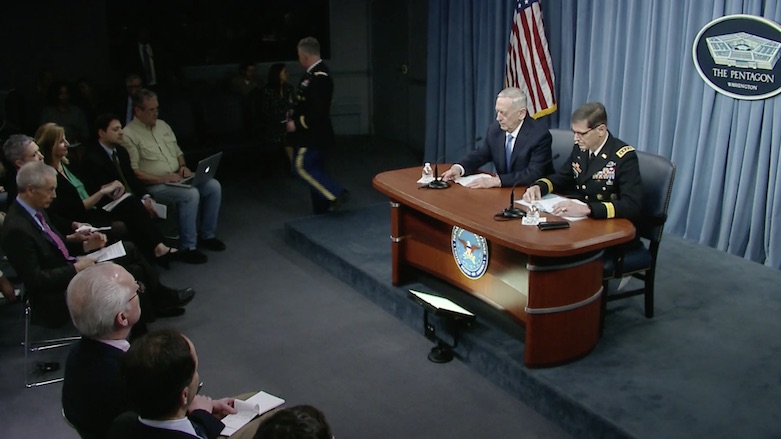CENTCOM Commander supports continued US military presence in Kurdistan

WASHINGTON DC, United States (Kurdistan24) – Gen. Joseph Votel, head of the US Central Command, on Tuesday told Kurdistan24 he favored a continued US presence in Iraq after the Islamic State (IS) was defeated and that such a presence should be maintained in both Iraq proper and the Kurdistan Region.
Having bases in both areas, the General explained, would increase the US military’s flexibility and its options, and “we can best support our partners that way.”
Votel is the highest-ranking US official to publicly express support for a continued US military presence in the Kurdistan Region after IS’ defeat.
Lt. Gen. Stephen Townsend, the commander of the US-led coalition in Iraq and Syria, earlier told the Pentagon press corps he preferred a continued US military presence in Iraq but declined to say where that presence should be.
“I won't try to parse out Iraqi Kurdistan,” Townsend said, as he replied to a question from Kurdistan24. “I'll just say that it is my personal belief” that “we walked away from Iraq a few years ago and we've already seen that movie.”
During Tuesday’s press briefing, US Secretary of Defense James Mattis was more circumspect, speaking, perhaps, with Baghdad’s political sensitivities in mind.
After all, when Washington last tried to secure Iraq’s agreement to a long-term US military presence in the country, the effort floundered.
“We are in consultations with the Iraqi government about what the stabilization phase looks like,” Mattis told the Pentagon press corps.
“There have been no decisions. There have been no offers made either way,” the Secretary of Defense added, as he noted an “active enemy” remains in the Euphrates River Valley, Tel Afar, and west Mosul.
Thus, it would be “premature to come to conclusions” about a continued US presence after IS’ defeat. “But we would be willing to engage with the Iraqi government on how it should look in the future,” Mattis concluded.
Experts outside the government are also giving serious consideration to the question of how the US can maintain security in the area after IS’ defeat and prevent the emergence of yet another like-minded terrorist group that threatens nearly the entire world.
Dr. David Phillips, formerly a senior advisor to the US State Department, and currently head of Columbia University’s Program on Peace-Building and Human Rights, recently discussed this challenge at Washington’s National Press Club, shortly before he gave testimony to a subcommittee of the House Foreign Affairs Committee.
At the Press Club, Phillips argued Turkey was “no longer secular and no longer a democracy,” and Washington must find an alternative to its dependence on the Incirlik air base, which it currently uses in the fight against IS.
The US needs to “diversify” its air operations, Phillips stated. “There is a perfectly suitable base outside of Erbil in Iraqi Kurdistan,” as well as bases in Cyprus and elsewhere, he advised.
In fact, Phillips proposed the Kurdistan Region should become a major focus of US security planning. “Part of the reason why we have a problem in Iraq today,” he explained, “is because we were not able to negotiate a Status of Forces Agreement (SOFA) with the government of Iraq,” before we left in 2011.
This time, Philips suggested, “The US should negotiate a SOFA with the Kurdistan Regional Government, and we should have a permanent, large military installation in Iraqi Kurdistan that goes beyond diversified air operations, one which serves as a hub for activity in the region.”
That is a genuinely bold vision, but one which the people and government of the Kurdistan Region would surely welcome.
Much remains uncertain in US security planning for the future of the area, including whether Baghdad will even agree to a long-term US military presence. Particularly, if it does not, then it is, indeed, a real possibility Phillips’ bold vision might become a reality.
Editing by Karzan Sulaivany
